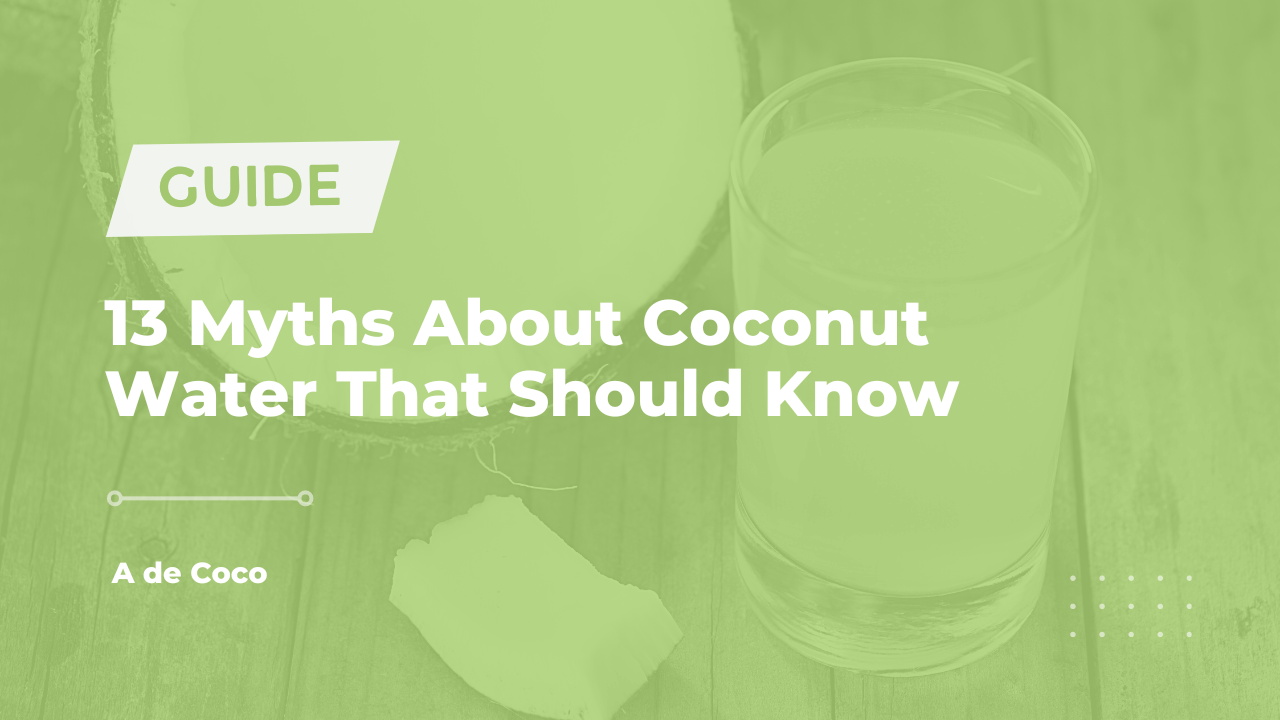Coconut water has recently seen a surge in popularity, celebrated as a refreshing drink and a health-enhancing marvel.
From being a post-workout staple to a beauty enhancer, its benefits are seemingly endless.
However, along with the health craze surrounding this tropical beverage, numerous misconceptions have risen.
Many are quick to accept these as facts, presenting a skewed image of the product.
As consumers, it is vital to separate fact from fiction.
Today we will be highlighting and debunking some of the common myths associated with coconut water consumption.
Contents
- Myths About Coconut Water That Should Know
- 1. Coconut Water Can Cure All Diseases
- 2. It’s a Complete Protein Source
- 3. Coconut Water Doesn’t Contain Calories
- 4. It’s a miracle hangover cure
- 5. Drinking coconut water aids instant weight loss
- 6. Coconut water can cure kidney stones
- 7. Coconut Water is a Sterile and Blood Plasma Substitute
- 8. It’s only for tropical countries
- 9. Coconut Water is a Hypoallergenic Drink
- 10. Coconut Water Lowers Blood Pressure Immediately
- The Bottom Line
Myths About Coconut Water That Should Know
1. Coconut Water Can Cure All Diseases
One of the most prominent myths about coconut water is that it is a panacea, or cure-all, for all types of diseases.
Touted often as a ‘miracle drink,’ many believe that consuming coconut water can contribute to alleviating an array of health problems.
From everyday common illnesses like the cold and flu to serious diseases such as cancer and diabetes, some people consider coconut water to be an effective remedy.
The truth of the matter, however, is that while coconut water does have beneficial properties, it should not be seen as a universal cure.
Though rich in nutrients, electrolytes, and antioxidants, coconut water does not possess the unique ability to cure ailments miraculously.
Scientifically speaking, there is yet to be concrete evidence that supports the notion of coconut water being able to cure all diseases.
While coconut water does indeed carry numerous health benefits, it should not be marketed as a magical remedy for all diseases.
The beneficial aspects of coconut water should not be overstated, as simply drinking coconut water certainly cannot replace adequate medical treatment for serious diseases.
Unfortunately, misleading information and unrealistic expectations associated with coconut water have led people to believe these unsupported claims.
Such misinterpretations can be dangerous as they might divert people from seeking proper medical advice and treatment.
It’s essential to understand that while incorporating coconut water into your diet may contribute to an overall healthier lifestyle, it is not an alternative to professional medical advice or treatment.
Coconut water’s true benefits lie more in its ability to rejuvenate the body, replenish electrolytes lost during physical activity, and provide hydration.
Relying solely on coconut water for treating serious medical conditions might lead to adverse consequences.
It’s crucial to debunk this myth about coconut water.
Rather than viewing it as a miracle cure, it’s best to appreciate coconut water for what it really is – a refreshing, hydrating, and nutrient-rich beverage.
A balanced approach to the consumption and understanding of coconut water’s health benefits can lead to more realistic expectations and healthier choices.
2. It’s a Complete Protein Source
One of the commonly spread myths about coconut water is that it’s a complete source of protein.
In reality, while coconut water does contain some proteins, it is not a comprehensive source of all the essential amino acids that our body requires.
A complete protein is one that contains all of the nine essential amino acids that our bodies cannot produce on their own.
These amino acids are critical for muscle growth and repair, and other vital bodily functions.
However, coconut water falls short of this classification, as it contains only a small amount of these essential amino acids.
It’s important to remember that while coconut water can complement a healthy diet, it cannot replace the need for a balanced intake of complete proteins from various dietary sources.
Typical sources of complete protein include meat, dairy, eggs, and certain plant-based foods like quinoa and soy.
Coconut water, at most, contains only about 2 grams of protein per cup, which is significantly lower than what you would find in recognized protein sources.
Therefore, while it may be a beneficial addition to a protein-rich diet, coconut water should not be relied upon as a primary source of protein.
This misconception likely arises from the fact that coconut milk, a different product entirely, does contain a higher amount of protein.
3. Coconut Water Doesn’t Contain Calories
One of the more popular myths surrounding coconut water is related to its calorie content, with many proponents of the beverage claiming that it contains no calories.
This assertion can be misleading and confusing for those who are trying to watch their caloric intake or follow a diet regimen.
Just like any other food or drink, coconut water does contain calories, but it is relatively low in calories compared to many other beverages.
Even though it’s significantly lower in calories than soda or juice, coconut water is not calorie-free.
Ignoring facts like these can lead people to consume more calories than they realize.
This calorie content has a lot to do with the nutritional composition of coconut water, which contains a mix of natural sugars, vitamins, minerals, and electrolytes.
Naturally, these nutrients add to the caloric value of the drink, making the myth of zero calories in coconut water unfounded and unrealistic.
It’s accurate to say that coconut water is a lower-calorie choice compared to other beverages like sodas or sugary drinks, but asserting it’s entirely free of calories simply isn’t true.
Importantly, recognizing that coconut water does have calories can assist individuals in managing their overall calorie intake, particularly if they are consuming it in large quantities.
Integrating coconut water into a diet, with the awareness of its calorie content in mind, can assist in the smart balancing of nutritional intake throughout the day.
When used correctly, coconut water can serve as an excellent hydration tool, particularly for those involved in high-intensity physical activity, where the body loses substantial amounts of water and electrolytes.
4. It’s a miracle hangover cure
Coconut water has been touted as a miracle hangover cure, which is supposed to alleviate the symptoms of a hangover almost immediately.
Its high level of hydration, natural sugars, and electrolytes is believed to replenish the body while counteracting the dehydration caused by alcohol.
Exploring the science behind this popular myth, it becomes clear that the effects of coconut water on hangovers are there but shouldn’t be considered truly one.
Whilst coconut water might encourage rehydration and be more pleasant to consume than plain water for some, other food and drink sources contain far higher levels of specific vitamins and nutrients necessary to ease hangover symptoms.
For instance, tomatoes, eggs, and bananas are rich in antioxidants and other compounds known to help the body recover after heavy drinking, something coconut water is deficient in.
Moreover, apart from hydration, proper rest, and possibly consuming certain foods, there is no guaranteed cure for hangovers.
Note that hangovers are the body’s reaction to the high intake of alcohol and its byproducts, and a severe hangover can signify that you have consumed a dangerous amount of alcohol.
While coconut water certainly has beneficial aspects, like its natural hydration properties, it should not be seen as a panacea to the physical repercussions of overindulgence in alcohol.
It’s much more effective to focus on moderate alcohol consumption and adequate hydration both before and after drinking.
5. Drinking coconut water aids instant weight loss
The belief that drinking coconut water can lead to instant weight loss is a common misconception.
Coconut water is indeed a healthy drink with low-calorie content and a good amount of beneficial nutrients, but claiming it to be a shortcut to weight loss is not entirely accurate.
Coconut water, like other natural beverages, can aid in weight loss only when it is incorporated into a balanced diet and combined with regular physical activity.
Despite its low calorie content, relying solely on coconut water for weight loss could lead to nutritional imbalances.
It’s also worth noting that while coconut water is generally low in calories, this does not make it a zero-caloric drink.
A typical serving of coconut water still contains around 45 to 60 calories, which, while low, still needs to be factored into your daily caloric intake.
Moreover, coconut water is a source of natural sugar, which means that excessive consumption can lead to increased calorie intake and ultimately, weight gain.
Even though it hydrates the body, it should not be viewed as a magic drink for instant weight loss.
The weight loss process is contingent upon creating a caloric deficit over an extended period through a combination of healthy eating and regular exercise.
While coconut water can serve as a healthier option compared to high-calorie sugary drinks, it’s not a replacement for water which has zero calories and is essential for optimum health.
It can serve as an excellent post-workout recovery drink due to its high electrolyte content, but again, it should not be treated as a miracle weight loss beverage.
6. Coconut water can cure kidney stones
One of the predominantly prevalent myths associated with the efficacy of coconut water is the belief that it can cure kidney stones.
This outlandishly optimistic belief stems from the fact that coconut water is rich in potassium, which is a vital nutrient that aids in the breakdown of kidney stones.
However, it is grossly simplistic to believe that coconut water, or any other food item for that matter, can be a standalone cure for diseases that are as complex and serious as kidney stones.
While coconut water can possibly aid in managing the symptoms or inhibiting the progression of kidney stones, dubbing it as a ‘cure’ is far from being factual.
Scientifically speaking, a cure for any disease involves completely eradicating the root cause of the disease and restoring the body to its original state of health.
This is something coconut water cannot achieve on its own when dealing with kidney stones.
Furthermore, it is important to recognize that kidney stones are often a result of several complex biological and lifestyle factors, most of which can’t be countered just by drinking coconut water.
While coconut water might provide some relief due to its hydrating properties and potassium content, it is no substitute for actual medical intervention.
7. Coconut Water is a Sterile and Blood Plasma Substitute
One of the often-repeated myths about coconut water is that it is sterile and can be used as a substitute for blood plasma.
This myth presumably started during World War II, when it was documented that in extreme emergencies, coconut water was used for short-term intravenous hydration.
However, it’s important to clarify that this was usually during life-or-death situations, and not a common practice or recommended solution.
Yes, coconut water and human blood plasma indeed share some similarities in composition, predominantly in terms of their electrolyte levels.
However, it is not accurate to state that coconut water can be used as a complete substitute for blood plasma in a clinical setting.
While coconut water does have electrolytes similar to those found in blood, it does not have enough of them to replace blood plasma.
Moreover, the assumption that coconut water is always sterile is not accurate, as it can also be subject to bacterial contamination, much like any other raw food or beverage.
Thus, it is highly advised against to use of coconut water as a blood plasma substitute, particularly without the supervision of a certified professional.
8. It’s only for tropical countries
Among the many misconceptions clouding coconut water, one of the most prevalent is the idea that this nutritious beverage is only suited to tropical countries.
This notion likely stems from the fact that coconut trees flourish primarily in tropical environments.
After all, it’s a well-documented fact that coconuts thrive in regions that offer consistent sunlight, ample rain, and high humidity.
Furthermore, the coconut’s intrinsic association with idyllic beach scenes and tropical getaways likely reinforces this well-worn cliche.
However, despite this strong tie to warmer climates, that doesn’t necessarily mean the nutritional benefits of coconut water are exclusively suited for tropical inhabitants.
The dietary needs of a human being, regardless of geographical whereabouts, are shockingly similar.
Individuals living in colder climates also require hydration, electrolytes, and micro-nutrients that coconut water is famed for providing.
Similarly, the properties of coconut water such as easing digestion, boosting hydration, and supplying essential vitamins, are beneficial to all, irrespective of their location on the globe.
In actuality, coconut water’s preeminence in tropical regions is more a matter of availability and convenience rather than necessity.
With the advent of modern transportation and preservation techniques, this nutritious drink is now easily accessible beyond the sandy beaches and sunlit landscapes of the tropics.
9. Coconut Water is a Hypoallergenic Drink
One common myth associated with coconut water is that it’s a hypoallergenic drink.
This perception likely arises from the fact that coconut water is a natural beverage with minimal processing, leading some to believe it causes no allergic reactions.
However, this is a misconception that should be clarified for consumer safety.
Although most people can indeed drink coconut water without experiencing negative effects, allergic reactions to coconut and its derivatives, including coconut water, have been documented.
These reactions can range from mild to severe, with symptoms such as skin irritation, itching, hives, and in worst-case scenarios, anaphylactic shock.
Coconut water being hypoallergenic is an unproven claim, overlooking that food allergies can be unpredictable and vary significantly from one individual to another.
Though coconut allergies are relatively uncommon, they are still possible and can be potentially serious.
Coconut water does not fall under the “major allergens” category issued by the Food Allergy & Anaphylaxis Network, but that does not exempt it from causing an allergic reaction.
Therefore, people with known allergies to coconuts should avoid drinking coconut water without speaking to a healthcare professional first.
Persons susceptible to food allergies should also exercise caution and speak to their doctors before incorporating the drink regularly into their diets.
In general, it’s crucial to remember that everyone’s body reacts differently to various substances and foods.
Just because it’s labeled as a natural product does not automatically mean it’s safe for everyone.
Individuals considering incorporating coconut water into their diets or using it for treatment should always consult with healthcare professionals to ensure that the potential benefits outweigh any potential risks.
10. Coconut Water Lowers Blood Pressure Immediately
Many people firmly believe that consuming coconut water can have an immediate effect on blood pressure, reducing it to healthier levels.
This belief is so ingrained that coconut water is often suggested as a home remedy for hypertension.
Several factors are said to contribute to this effect.
Firstly, coconut water has a high potassium content, a significant mineral that can help decrease blood pressure levels by balancing out the negative effects of sodium.
Drinking coconut water might benefit those with high blood pressure, due to its significant levels of potassium.
Moreover, coconut water encompasses magnesium and vitamin C, both elements that potentially promote lower blood pressure.
As wonderful as that might sound, there is not enough concrete scientific evidence supporting the claim that coconut water can instantly lower blood pressure.
Most of the research done so far involves small sample sizes or is conducted on animals, which makes it hard to draw a reliable conclusion for humans.
So while drinking coconut water can be part of a diet aimed at reducing blood pressure, it should certainly not be considered an instant cure.
Any affirmation stating coconut water can lower blood pressure immediately is a myth.
Blood pressure, like any disease, cannot be cured overnight.
It requires a comprehensive approach that includes a balanced diet, regular exercise, and, in some cases, medication.
The Bottom Line
Despite all the claims, it’s important to approach the virtues of coconut water with a critical eye.
While it is believed to cure all diseases and act as a complete protein source and miracle hangover cure, facts vary.
Although it has some health benefits, it cannot fully cure kidney stones or fight heart disease on its own.
This hydrating drink, often enjoyed in tropical countries, is not immune to containing allergens, nor can it instantly improve skin or aid in immediate weight loss.
Regarded as a blood plasma substitute due to its sterility, it does not mean it can completely take over the role of medically approved plasma.
Lastly, coconut water can help with hydration, but cannot alone lower blood pressure immediately or surpass the hydration levels of water.
Therefore, while coconut water can be enjoyed as a refreshing, somewhat healthy drink, its miraculous properties are often overstated.




